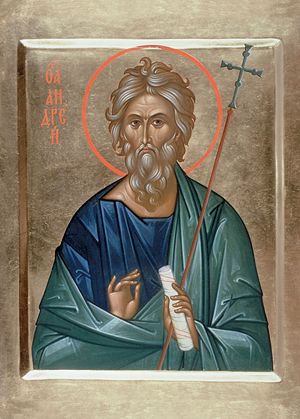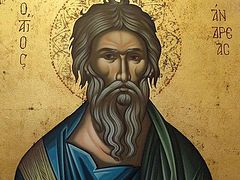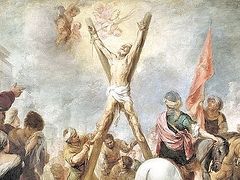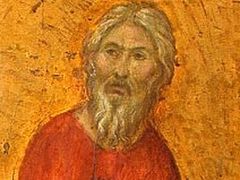 Whosoever therefore shall confess me before men, him will I confess also before my Father which is in heaven (Matt. 10:32), said the Lord Jesus Christ to His disciples, requiring of them not only faith and following Him, but also confession and preaching this faith before men. How faithfully and exactly they fulfilled this commandment can be seen from their labors of preaching and asceticism and their painful deaths. Their beautiful feet covered the entire universe, their spirit-bearing sermons sounded forth in all languages, and their apostolic labors were accompanied everywhere by persecutions, sufferings, and martyric death for confessing the name of the Lord Jesus.
Whosoever therefore shall confess me before men, him will I confess also before my Father which is in heaven (Matt. 10:32), said the Lord Jesus Christ to His disciples, requiring of them not only faith and following Him, but also confession and preaching this faith before men. How faithfully and exactly they fulfilled this commandment can be seen from their labors of preaching and asceticism and their painful deaths. Their beautiful feet covered the entire universe, their spirit-bearing sermons sounded forth in all languages, and their apostolic labors were accompanied everywhere by persecutions, sufferings, and martyric death for confessing the name of the Lord Jesus.
One of these God-bearing confessors, who illumined with his apostolic feet and sowed the life-bearing seed of God’s word also in the Russian lands—then quite wild—does the Church honor today. Having covered many countries with his preaching of the Gospel, St. Andrew ended his travels in the city of Patras with the ascetic labor of confession and martyrdom. No matter how the Proconsul Aegeates pressured him with both coaxing and threats to cease preaching the name of Jesus, the first-called apostle did not stop teaching the proconsul himself about the mysteries of the Christian faith. No matter how Aegeates tormented him with all manner of torture, St. Andrew did not cease to confess will full voice the name of Jesus Christ, and prayed only that the Lord would enlighten the torturer himself with His grace and make him worthy of eternal life. Finally, as he was being crucified on the cross, for three days he was not silent as he confessed the name of the Lord Jesus Christ before the crowds of people who gathered around, unceasingly teaching them all not only the faith, but confession of the faith and endurance for the sake of the faith, saying, “For there is no torment worthy of the reward to come.” This means, my brother, that the commandment to confess the name of the Lord Jesus Christ before men, which the holy apostles took up, is according to the apostle’s words obligatory for all who believe in Christ. A true Christian cannot but be a confessor. The words of faith are not only in his heart but also on his lips: For with the heart man believeth unto righteousness; and with the mouth confession is made unto salvation (Rom 10:10), says the apostle Paul in today’s epistle reading. Thus, it is not enough just to believe; one has to confess his faith by word and deed, by lips and life. The truly believing must speak with his lips because he believes with his heart: I believed, and so I spake; and he only speaks what he believes: Let no corrupt communication proceed out of your mouth, but that which is good to the use of edifying, that it may minister grace unto the hearers (Eph. 4:29). He necessarily lives and acts according to faith, because he is convinced with all his heart that faith without works is dead and cannot give him eternal life.
In this perfect harmony between lips and heart, internal and external life, does true faith consist; from this proceeds our justification and salvation: That if thou shalt confess with thy mouth the Lord Jesus, and shalt believe in thine heart that God hath raised him from the dead, thou shalt be saved (Rom. 10:9).
What is faith without confession? A lamp under a bushel, which illumines nothing. Moreover that lamp is without oil, and will soon go out. For whoever does not want to show his faith in his words and deeds has a dead faith, not enlivened by true love for the One in Whom he believes. Faith, which loves the Lord, cannot but talk about her Beloved, cannot but glorify His love and goodness, laud His mercy and love for mankind, and give thanks for His generosity and mercies. The heart that is filled with strong feelings of love and gratitude for the Lord cannot but pour out its feelings by means of words: For of the abundance of the heart his mouth speaketh (Lk. 6:45). From this comes the living need for common prayer and laudation, divine services in church, preaching, pious discourse, reverent exercise in divine contemplation—all of this is the radiance of faith, its burning, and its confession. Therefore my brothers, whoever is ashamed to manifest the fruits of heartfelt faith to others, whoever inclines away from God’s church and the assembly of faithful when fashion requires it, whoever hides his heart’s conviction of faith before the mockery of shameless and impious people, in this way involuntarily adapting to the tone of disbelief, should beware that the Lord’s words might befall him: Whosoever therefore shall be ashamed of me and of my words in this adulterous and sinful generation; of him also shall the Son of man be ashamed, when he cometh in the glory of his Father with the holy angels (Mk. 8:38).
On the other hand, what is the confession of the lips without the faith of the heart? It is a deceptive, cold light, the adornment of a corpse, a whited sepulcher, as the Lord Himself calls it. This people draweth nigh unto me with their mouth, and honoureth me with their lips; but their heart is far from me. But in vain they do worship me, teaching for doctrines the commandments of men... Woe unto you, scribes and Pharisees, hypocrites! for ye are like unto whited sepulchres, which indeed appear beautiful outward, but are within full of dead men’s bones, and of all uncleanness (Mt. 15:8–9; 23:27). Thus, my brothers, we should not think that confession of faith can be limited to words alone. Where there is faith of the heart and confession according to faith, there deeds of faith and love appear by themselves—unashamed and fearless confession is itself a great, holy, and God-pleasing work of faith: But whosoever shall deny me before men, says the Lord, him will I also deny before my Father which is in heaven (Mt. 10:33). And the whole host of holy martyrs, glorified in the kingdom of God, witness to Christ’s words. What podvig is higher than their podvig of confession of faith? What virtue is more glorious than their unconquerable patience and confession of Christ? And don’t all other good works proceed, like good fruits from a good tree, from true faith and confession of faith? And isn’t it from this that they receive the true price and dignity of holy and God-pleasing works?
Why is a true Christian the faithful servant of his King and country, submissive to authority, dedicated with all his heart to the duty placed upon him, faithful in everything to the last drop of his blood? Because his heart is filled with faith in the Lord Jesus Christ; because he believes with all his heart that every fatherland on heaven and on earth receives its name from the one Father Who is in heaven—because he confesses with the Apostles: But if any provide not for his own, and specially for those of his own house, he hath denied the faith, and is worse than an infidel (1 Tim. 5:8). Let this be our defense in Jesus Christ against our sins. Thus must we confess fearlessly our faith everywhere and always, so that this confession of faith would serve us unto eternal salvation, as the Lord promised. Thus must we live and act according to faith, so that our lips would not contradict our hearts, nor our deeds and acts contradict our words, so that the Lord Jesus Christ, Whose holy and worshipped name we bear, might not say to us when we appear to Him after death, “I know you not, depart from Me, ye who work iniquity.”
Why is a believer a peaceful citizen, without ill wishes, a helpful and responsible neighbor, a loyal, tender, and caring friend, doing good for all; the father of orphans, the eye of the blind, the legs of the lame; meek and guileless towards even those who wish him the worst, towards his enemies? Because he believes with all his heart the words of his Lord: Therefore all things whatsoever ye would that men should do to you, do ye even so to them (Mt. 7:12); because he confesses himself to be the son of the heavenly Father, Who is good to the graceless and evil, makes His sun to shine upon both the wicked and the good, and sends His rain to fall upon both righteous and the unrightous; therefore the Christian strives to be merciful, as his Father in Heaven is merciful. Why does Christ’s true disciple run to the temple of the Lord at every opportunity, and like the ancient prophet loves more to be an outcast in the house of my God than to dwell in the tents of sinners (Ps. 83:11) and asks only of the Lord that he might live in the house of the Lord all the days of his life, to look upon the beauty of the Lord and visit his holy temple? Because he believes with all his heart that the temple of the Lord is truly the house of God, in which the Lord and Savior Himself abides eternally not only in His divinity, but also in His most pure flesh; it is a holy place of purification, in which the redeeming sacrifice is brought for people’s sins; within it is the treasure of God’s grace and our illumination; it is the place of unification and communion with all those who believe in Christ Jesus. Because he is convinced with all his heart that by distancing himself from God’s church, he falls away from the union of the faithful, is torn from the body of Christ’s Church, becomes its deadened member, a dry branch on a life-creating vine. In a word, the true servant of Christ, confessing the Lord with his heart and lips, cannot but confess Him also with his deeds; for he remembers and fulfills the Lord’s words: Let your light so shine before men, that they may see your good works, and glorify your Father which is in heaven (Mt. 5:16). Not every one that saith unto me, Lord, Lord, shall enter into the kingdom of heaven; but he that doeth the will of my Father which is in heaven (Mt. 7:21). Thus, my brothers, should we believe with our hearts, so that our faith would be counted to us as truth. Amen.
From Complete collection of sermons by Archbishop Dimitry of Cherson and Odessa, Vol. 2 (Moscow: Printing house of F. K. Joganson, 1889), 401-6 [Russian].



